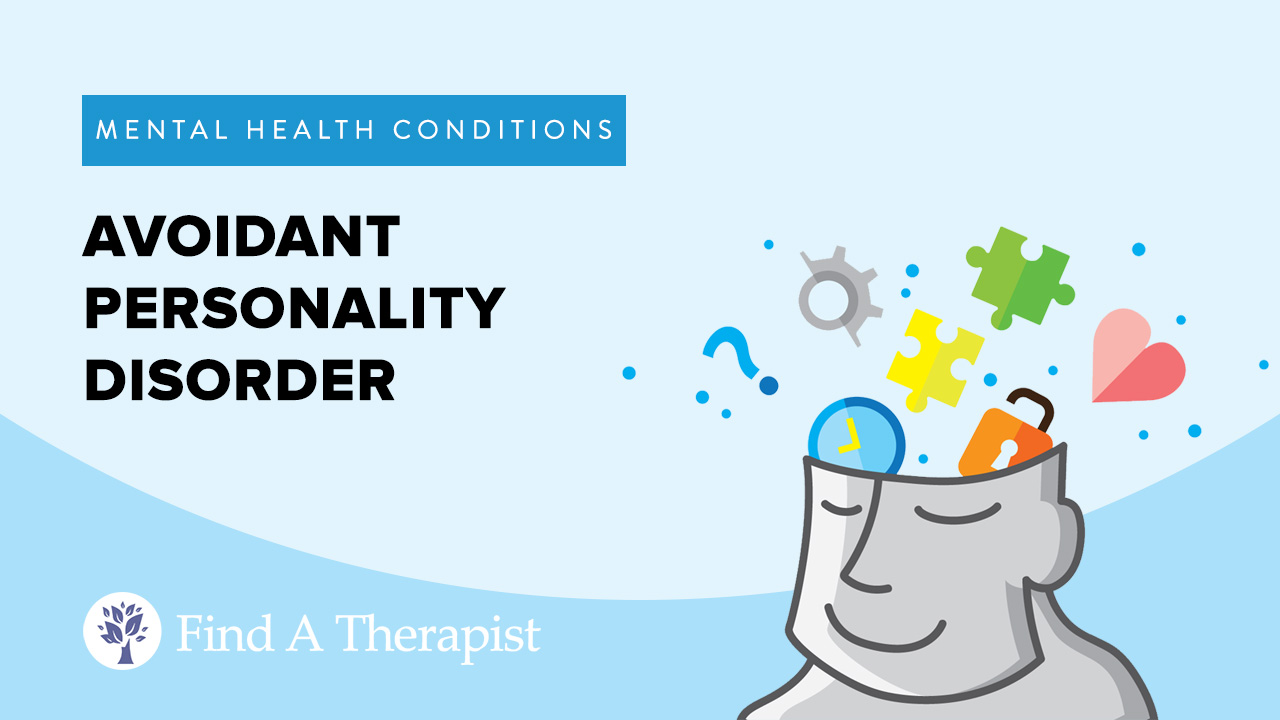What Is Avoidant Personality Disorder?
Published on September 9th, 2020
Updated on January 4th, 2024

Avoidant personality disorder (AVPD) causes a person to struggle with relationships. People with AVPD struggle to feel comfortable with other people. They tend to have a persistent fear of being judged.
People with AVPD crave healthy relationships. Their fear of judgment often holds them back from being able to connect with others. This fear goes beyond typical nerves people may experience when meeting new people. It causes a level of social anxiety that is so intense that it prevents people from engaging with others.
The fear of judgment or being seen as ‘less than’ holds people with AVPD back from engaging with society. Career, academics, and social skills are all affected by AVPD.
Sponsored by

Choose a therapist to work with and start healing with 20% off from BetterHelp.
Click HerePeople with AVPD struggle with a persistent fear of opening up to people. They crave closeness with others, but their fear of criticism causes them to withdraw. This prevents them from embracing opportunities to build a relationship with another. Their fear of embarrassment and rejection creates a habit of avoiding social situations.
Avoidant personality disorder causes people to assume that they are unlikeable. They expect that they will not be accepted by other people. Because of this assumption, they try to avoid social situations. When social situations cannot be avoided, affected people will have an emotional guard that is difficult to break down. The affected person will remain uncomfortable in a relationship until they are confident that they are accepted.
People who are affected by AVPD are often desperate for meaningful relationships with others. They isolate themselves from social settings because they are afraid of rejection and judgment. This does not mean they are not interested in friendships, relationships, and companionship.
Signs and Symptoms of Avoidant Personality Disorder
Symptoms of avoidant personality disorder are the most noticeable in social situations. Settings that involve interacting with other people tend to be stressful for an affected person. They may struggle in social situations that involve:
- Work
- School
- Family
- Hobbies
- Romantic settings
A person who struggles with AVPD will suffer from symptoms of the condition. These symptoms will be most noticeable in social situations. Symptoms will also reflect the affected person’s attitude toward social interactions and how they relate to others. Common symptoms of AVPD include:
- Avoiding social situations and activities
- Social isolation
- Refusal to interact with others unless sure they will be liked
- Intense anxiety in social situations
- Feeling overwhelmed by the thought of socializing
- Assuming others are judging them
- Extreme sensitivity to real or imagined criticism or teasing
- Negative self-talk
- Feeling inept, inferior, or burdensome in social situations
- Seeming quiet or disengaged in social settings
- Feelings of inadequacy
- Intense fears of embarrassment, criticism, or rejection
- Sense of inferiority
- Fears of being degraded or shamed in intimate relationships
Risk Factors of Avoidant Personality Disorder
It is a disorder that may have different reasons for developing. These reasons depend on a number of traits. Such traits include a person’s personality, lifestyle, and upbringing.
A person with AVPD may be shy or standoffish. They may also be introverted and prefer solitary activities. Those who tend to be emotionally sensitive are at higher risk of struggling with AVPD.
A person’s chances of having AVPD reflect key factors of their childhood. The fear of rejection and avoidance of other people can stem from a lack of a nurturing and secure home environment while growing up. It can also grow from being bullied by peers as a child or having critical parents.
The following are common risk factors for AVPD:
- Being shy as a child
- Growing up in an insecure household
- A lack of affection or nurturing from parents
- Difficulty making friends as a child
- Being bullied by peers
- Developing a distrust for people due to social trauma
- Struggling with social anxiety as a child
- A history of substance use or addiction
- Feeling criticized or unaccepted throughout life
People are also at increased risk of AVPD if they struggle with other mental health conditions. There are mental health conditions that often co-occur with AVPD.
The following are disorders that people may struggle with along with AVPD:
- Anxiety
- Social anxiety
- Depression
- Borderline personality disorder
- Body Dysmorphia
- Dependent personality disorder
- Substance use

Treatment Options For Avoidant Personality Disorder
Avoidant personality disorder can be a challenging disorder to treat. People who suffer from AVPD struggle with feeling comfortable in social situations. This can be challenging for affected people because they tend to crave deep, meaningful relationships with others.
This struggle is often constant for an affected person. It can be difficult for a person with AVPD to open up to the possibility of treatment and recovery.
People with AVPD tend to need long-term talk therapy. Talk therapy for AVPD focuses primarily on addressing and modifying negative thought patterns. This process is most commonly used in cognitive behavioral therapy.
Cognitive-Behavioral Therapy (CBT) is a popular form of therapy. It teaches a person how to address their negative thoughts. With CBT, a person learns how to challenge the thought patterns that cause them anxiety and distress. They learn healthier patterns of thinking. This practice helps a person with AVPD can begin to learn how to open themselves up to others.
It can also be helpful to incorporate mindfulness practices into therapy for AVPD. Mindfulness practices can help a person feel grounded in the present moment. With mindfulness skills, a person with AVPD can learn skills to focus on the here and now. This method prevents them from getting caught up in their anxious thoughts.
Mindfulness practices teach skills that involve checking in with oneself. This helps to ensure healthy thoughts, feelings, and behaviors.
The discomfort that comes from social situations can cause affected people to feel inferior to others. This results in resentment toward people who mean no harm to them. This pattern can be challenged with a combination of CBT and mindfulness practices.
It does take time, patience, and repetition to learn these thought challenging skills. Once mastered, a person with AVPD can make a difference in how they perceive others and themselves. This can help them improve their self-esteem and boost confidence when in social situations.
Sponsored by

Find an affordable therapist online with 20% off from BetterHelp.
Click Here






Leave A Reply